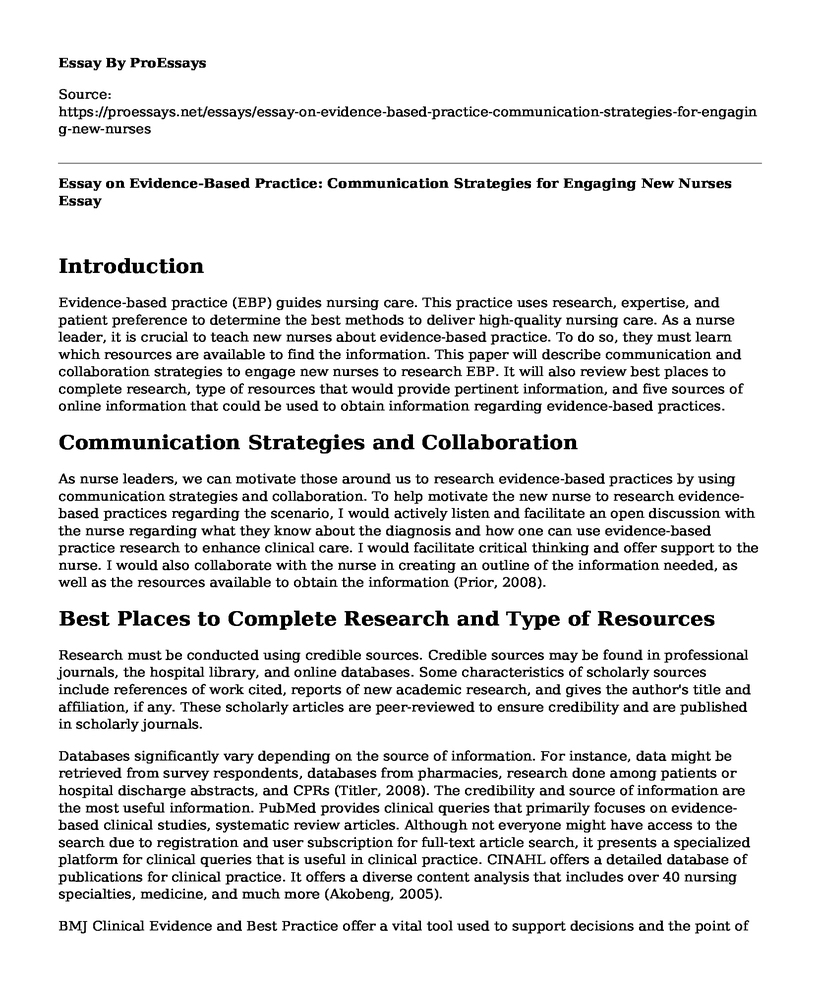Introduction
Evidence-based practice (EBP) guides nursing care. This practice uses research, expertise, and patient preference to determine the best methods to deliver high-quality nursing care. As a nurse leader, it is crucial to teach new nurses about evidence-based practice. To do so, they must learn which resources are available to find the information. This paper will describe communication and collaboration strategies to engage new nurses to research EBP. It will also review best places to complete research, type of resources that would provide pertinent information, and five sources of online information that could be used to obtain information regarding evidence-based practices.
Communication Strategies and Collaboration
As nurse leaders, we can motivate those around us to research evidence-based practices by using communication strategies and collaboration. To help motivate the new nurse to research evidence-based practices regarding the scenario, I would actively listen and facilitate an open discussion with the nurse regarding what they know about the diagnosis and how one can use evidence-based practice research to enhance clinical care. I would facilitate critical thinking and offer support to the nurse. I would also collaborate with the nurse in creating an outline of the information needed, as well as the resources available to obtain the information (Prior, 2008).
Best Places to Complete Research and Type of Resources
Research must be conducted using credible sources. Credible sources may be found in professional journals, the hospital library, and online databases. Some characteristics of scholarly sources include references of work cited, reports of new academic research, and gives the author's title and affiliation, if any. These scholarly articles are peer-reviewed to ensure credibility and are published in scholarly journals.
Databases significantly vary depending on the source of information. For instance, data might be retrieved from survey respondents, databases from pharmacies, research done among patients or hospital discharge abstracts, and CPRs (Titler, 2008). The credibility and source of information are the most useful information. PubMed provides clinical queries that primarily focuses on evidence-based clinical studies, systematic review articles. Although not everyone might have access to the search due to registration and user subscription for full-text article search, it presents a specialized platform for clinical queries that is useful in clinical practice. CINAHL offers a detailed database of publications for clinical practice. It offers a diverse content analysis that includes over 40 nursing specialties, medicine, and much more (Akobeng, 2005).
BMJ Clinical Evidence and Best Practice offer a vital tool used to support decisions and the point of care. The database offers up-to-date clinical evidence and research, expert opinions that are offered in a stepwise approach, diagnosis assistant, and prognosis. Based on the latest knowledge concerning the prevention and treatment of clinical conditions, the database is appropriate for clinical practice since it is based on a comprehensive search of the literature. Cochrane Library is a platform that gives high-quality information for healthcare workers to make informed decisions. It provides an in-depth clinical trial interpretation that focuses on clinical trials and evidence-based medicine from members globally, including healthcare professionals and researchers willing to improve health outcomes. UpToDate is an essential database designed to assist healthcare practitioners with answers to clinical questions. The database covers questions from over 10,000 clinical topics and over 20 medical specialties.
Nurses must remain updated with relevant practices to provide high-quality care and improved patient outcomes. Nurses are in the frontline of using evidence-based practice; therefore, they need to consider the latest healthcare research while determining treatment or care.
References
Akobeng, A. K. (2005). Principles of evidence-based medicine. Archives of disease in childhood, 90(8), 837-840. http://dx.doi.org/10.1136/adc.2005.071761
Prior, P. (2008). What factors influence primary health care nurses' implementation of evidence in clinical practice: a descriptive survey: a 60 point research report in partial fulfillment of the requirements for the degree of Master of Nursing at Massey University, Albany, New Zealand (Doctoral dissertation, Massey University). http://hdl.handle.net/10179/15074
Titler, M. G. (2008). The evidence for evidence-based practice implementation. In-Patient safety and quality: An evidence-based handbook for nurses. Agency for Healthcare Research and Quality (US). https://www.ncbi.nlm.nih.gov/books/NBK2659/
Cite this page
Essay on Evidence-Based Practice: Communication Strategies for Engaging New Nurses. (2023, May 21). Retrieved from https://proessays.net/essays/essay-on-evidence-based-practice-communication-strategies-for-engaging-new-nurses
If you are the original author of this essay and no longer wish to have it published on the ProEssays website, please click below to request its removal:
- Reason Behind My Interest to Study Periodontics Essay
- Applying the Tripartite Model of Nurse Educators Paper Example
- Interview Project Paper on Moral Ethics in Social Work
- The Chronic Respiratory Health Effects That the Firefighters Are Exposed to Paper Example
- Essay Sample on Congestive Heart Failure Readmissions
- Charles Manson: Unjustly Imprisoned Despite Mental Illness and Colon Cancer - Essay Sample
- Essay Example on Alfred Adler: Advancing Equality, Mutual Respect & Community Health







